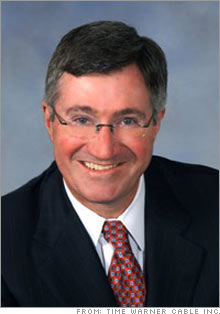Cable's next star CEOTime Warner Cable's supremely low profile CEO is about to be thrust into the limelight, reports Fortune's Stephanie Mehta.NEW YORK (Fortune) -- Who is Glenn Britt? Unless you work in the cable industry, or you're a particularly observant owner of Time Warner stock, you've probably never heard of Britt, who happens to be CEO of the media conglomerate's cable unit. That's all about to change. Time Warner Cable is set to become a publicly traded company, a structural change that will thrust the supremely low profile Britt into the public eye. Instead of being one of Time Warner's cadre of division heads, Britt will have all the responsibilities of a public company CEO - the speaking gigs at investor conferences, the Sarbanes-Oxley requirements, the shareholder meetings - but with one complicated twist: his company still will be 85 percent owned by Time Warner (Charts). (Time Warner is the parent company of Fortune and CNNMoney.com)
People who know Britt say he has the right demeanor to juggle the demands of public shareholders as well as Time Warner CEO Dick Parsons. The New Jersey native has spent his entire career at Time Warner companies, starting at magazine publisher Time Inc., where he worked in the controller's department, Time Inc.'s fledgling cable system (then called Manhattan Cable), and HBO. He even spent 18 months in Tehran, Iran, working for Time-Life Books, which was helping the government publish how-to manuals. Britt left the Middle East a year before the overthrow of the Shah of Iran, "not because I was smart," he told Multichannel News in a 2006 article, "but because my contract was up." After Time Inc. and Warner Communications merged, Britt moved over to the combined company's cable operations, where he stayed. At Time Warner, Britt works side-by-side with programming executives from the corporation's Turner unit, as well as content creators from Warner Bros. and New Line. He also has had to peacefully coexist with dial-up provider America Online as Time Warner Cable is pushing its competing Roadrunner broadband service. (AOL has since changed its focus to delivering free e-mail and online content through its AOL.com Web portal.) In short, he's had to be something of a diplomat, a trait that carries into his dealings throughout the industry. "He has excellent relationships with the other [cable] executives as well as the senior programming executives, which in today's environment is fairly remarkable," says Carrie Pryor, a senior client partner at Korn/Ferry International, a recruiting firm. But don't be fooled by Britt's gentlemanly demeanor. Britt, analysts say, moved aggressively into telephone service, a business that has good margins and helps the cable company retain its core pay-television customers. (Time Warner Cable has more than 1.6 million phone customers today.) He has encouraged the company to come up with innovative technologies, like a "start over" service that lets customers restart a program at any time during its run. And within Time Warner, Britt has tried to push cable into the spotlight. Under Dick Parsons, Time Warner has tried to treat all its units fairly equally: All the units typically get equal time on earnings calls and no division head is singled out for star treatment. (This is a departure from the old days at Time Warner, when many of the division heads operated autonomously, and, in the case of executives such as former Warner Bros. chiefs Bob Daly and Terry Semel - now Yahoo CEO - or HBO Chair Michael Fuchs, grabbed their share of headlines.) Britt, sources say, has sought to elevate the cable unit's profile in the business press and other outlets. Britt and other Time Warner Cable executives declined to be interviewed because the cable unit is in a quiet period in advance of its public offering. Britt soon won't have to court attention. Based on its 2005 sales, Time Warner Cable, had it been a stand-alone company, would have ranked 251st on the Fortune 500 list, ahead of companies such as Southwest Airlines (Charts) and Amazon.com (Charts). If it had owned the cable systems it teamed up with Cable rival Comcast (Charts) to acquire from Adelphia, the company would have had $13 billion in 2005 sales, making it roughly the same size as Texas Instruments was that year - and bigger than Oracle and Capital One. The cable unit is launching a glitzy Home to the Future exhibit at the swank Time Warner Center in Manhattan next week, and, according to UBS cable analyst Aryeh Bourkoff, Time Warner cable could begin trading on the New York Stock Exchange as early as January 17. Once that happens, investors won't be asking "Who's Glenn Britt" for much longer. |
|

